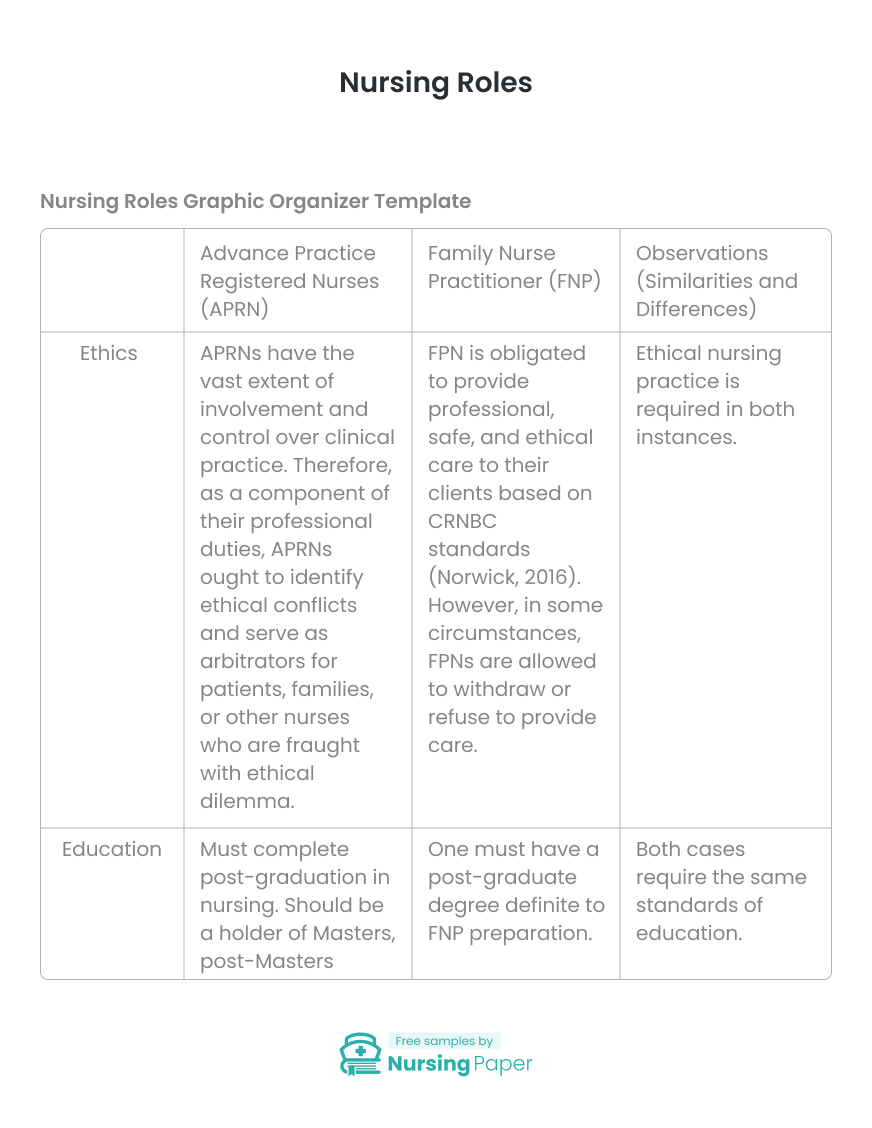
Advance Practice Registered Nurses (APRN)
Ethics
APRNs have the vast extent of involvement and control over clinical practice. Therefore, as a component of their professional duties, APRNs ought to identify ethical conflicts and serve as arbitrators for patients, families, or other nurses who are fraught with ethical dilemma.
Education
Must complete post-graduation in nursing. Should be a holder of Masters, post-Masters certification, or practice-oriented doctor of nursing practice degree in a specific role (Phillips, 2016). Should be a holder of a valid RN license given after passing NCLEX-RN exams.


Leadership
They have advanced expertise and scope of practice. They are relied upon as leaders in the implementation of care plans and function as consultants, educators, researchers, and case managers.
Public Health
APRN promotes public health by employing a holistic view of health and wellbeing aiming at assessing and proving treatment to improve quality of life in the larger community.
Informatics. Information technology provides elaborated, innovative, and practical approaches across the professional teams to foster the quality of patient care and support population health initiatives such as assessment of diagnostic labs and procedures (Jones & Taylor, 2015).
Business/Finance
Some states permit independent practice devoid of physician supervision. APRNs are allowed to open businesses, prescribe drugs, and practice to the scope granted by their training.

Specialty
Clinical nurse specialist, certified registered nurse anesthetist, nurse practitioner, and certified nurse midwife (Jokiniemi, Haatainen & Pietilä, 2015).
Family Nurse Practitioner (FNP)
Ethics
FPN is obligated to provide professional, safe, and ethical care to their clients based on CRNBC standards (Norwick, 2016). However, in some circumstances, FPNs are allowed to withdraw or refuse to provide care.
Education
One must have a post-graduate degree definite to FNP preparation. May include Masters degree in nursing, majoring in family practice or a Doctor of Nursing Practice (DNP). Must be registered nurse licensed by NCLEX-RN after passing their exams.



Leadership
FNP should possess critical leadership attributes such as integrity, communication skills, emotional intelligence, respect, expert socialization, and devotion to excellence.
Public Health
FNP expands the role of APRN to employ holistic view of health and wellbeing of patients. However, they concentrate on family units and not the community at large.
Informatics
Uses information technology to improve patient care and quality such as ordering medical tests, coding for billings, documenting patient information, and assessment of findings.
Business/Finance
Some states allow FNPs to open their businesses and practice to the degree of their training.
Specialty
FNP is a specialization under general nurse practitioner.
Observations (Similarities and Differences)
Ethics
Ethical nursing practice is required in both instances.
Education
Both cases require the same standards of education.
Leadership
Both APRN and FNR should possess the necessary leadership attributes.
Public Health
All aim at improving public health, though in different levels.
Informatics
Informatics is necessary in both cases to provide quality care and improve patient outcome.
Business/Finance
Nurses are free to work independently, but only in some states.
Specialty
APRN has broad specializations under it, while FNP is just a specialization under nurse practitioner.
1. Jokiniemi, K., Haatainen, K., & Pietilä, A. M. (2015). From challenges to advanced practice registered nursing role development: Qualitative interview study. International Journal of Nursing Practice, 21, 6, 896-903.
2. Jones, M., & Taylor, A. (2015). Exploring nursing students, registered nurses, and advanced practice registered nurses’ interest in doctor of nursing practice degree programs. Clinical Scholars Review, 8, 1, 66-69.
3. Melaku-Abbera, H., & Smith, D. (2017). Evaluation of a Family Nurse practitioner‒led Individualized Diabetes Care Model in a Primary Care. The Journal for Nurse Practitioners, 13, 3.
4. Norwick, R. (2016). Family Nurse Practitioner Residency for Recruiting and Retention. The Journal for Nurse Practitioners, 12, 5.
5. Phillips, S. J. (2016). 28th Annual APRN Legislative Update: Advancements continue for APRN practice. The Nurse Practitioner, 41, 1, 21-48.



The download will start shortly.

The download will start shortly.
 Subject:
Medicine
Subject:
Medicine  Number of pages: 10
Number of pages: 10  Subject:
Nursing
Subject:
Nursing  Number of pages: 4
Number of pages: 4  Subject:
Nursing
Subject:
Nursing  Number of pages: 2
Number of pages: 2  Subject:
Health and Social Care
Subject:
Health and Social Care  Number of pages: 2
Number of pages: 2  Subject:
Health and Social Care
Subject:
Health and Social Care  Number of pages: 3
Number of pages: 3  Subject:
Nursing
Subject:
Nursing  Number of pages: 2
Number of pages: 2  Subject:
Health and Social Care
Subject:
Health and Social Care  Number of pages: 3
Number of pages: 3  Subject:
Nursing
Subject:
Nursing  Number of pages: 4
Number of pages: 4  Subject:
Health and Social Care
Subject:
Health and Social Care  Number of pages: 2
Number of pages: 2  Subject:
Nursing
Subject:
Nursing  Number of pages: 11
Number of pages: 11  Subject:
Medicine
Subject:
Medicine  Number of pages: 6
Number of pages: 6  Subject:
Nursing
Subject:
Nursing  Number of pages: 4
Number of pages: 4  Subject:
Nursing
Subject:
Nursing  Number of pages: 4
Number of pages: 4  Subject:
Nursing
Subject:
Nursing  Number of pages: 4
Number of pages: 4  Subject:
Nursing
Subject:
Nursing  Number of pages: 5
Number of pages: 5 
